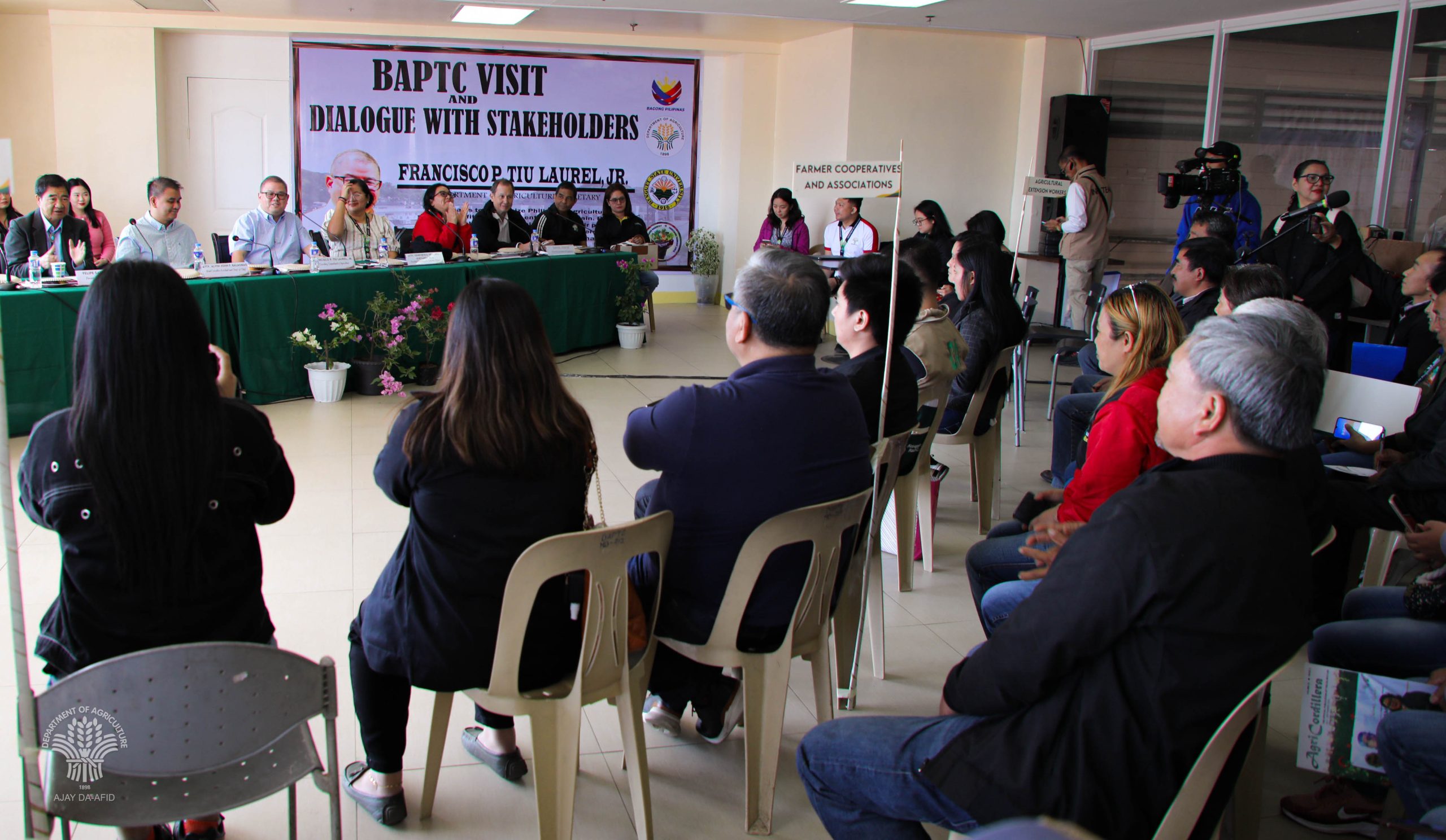
Agriculture Secretary Francisco P. Tiu Laurel, Jr. led a town hall meeting with highland vegetable industry stakeholders during a visit to the Benguet Agri-Pinoy Trading Center on January 26, 2024.
The goal, Sec. Tiu Laurel said, is to find ways to further develop the farm sector and raise income in the Cordillera region.
“Konsultasyon talaga ito para magkaroon tayo ng polisiya na gusto ninyo at nais rin natin sa pamahalaan para ma-achieve ang layunin ni Pangulong Marcos na Bagong Pilipinas. Bago lahat. Bagong direksyon para mapaganda ang buhay ng bawat Pilipino,” Sec. Tiu Laurel said.
The dialogue included key officials, farmer leaders, traders, truckers, market facilitators, agricultural extension workers, municipal and provincial agriculturists, and other stakeholders from Benguet, Ifugao, and Mountain Province.
“Gusto kong malaman niyo na hindi kayo nakakalimutan ng DA. Sa mga stakeholders ng cabbage, tomato, carrots, potatoes, lahat iyan importante. Lahat yan prayoridad ng gobyerno. Kaya dinala ko itong buong team dito na kasama natin sa national office para makatulong pag-isipan iyong current situation natin and see how we can improve,” the Secretary said.
He said his visit should underscore his commitment to dealing with the challenges faced by the vegetable industry. The primary goal of the dialogue, he added, is to align strategies that reduce the production cost of farmers and increase their income.
“Mapababa ang overall cost of production pero ma-maintain or mapataas pa ang kita ng farmers — iyan ang ating dapat pag-isipang mabuti at pagtulong-tulungan para maging happy naman ang farmers at consumers,” the agriculture chief said.
During the consultation, Secretary Tiu Laurel pledged to translate these efforts into tangible results for the nation, specifically focusing on meeting the country’s expectations of providing ample food supply, lowering commodity prices, and improving efficiency while minimizing costs.
Issues raised during the town hall meeting include the high cost of farm inputs, like fertilizers, seeds, and pesticides; lack of market outlets for Good Agricultural Practices-certified products; concerns about the unrecognized foodlane pass by authorities; and issues related to smuggling.
Secretary Tiu Laurel pledged a series of initiatives, including the establishment nationwide of facilities similar to those found in the Food Terminal Inc., creating market outlets for GAP-certified products, expanding KADIWA stores in Metro Manila, enforcing laws related to vegetable and fisheries trading, ensuring the strict implementation of the EO 41 which suspended collection of fees by local government units from vehicles transporting goods, and providing support to the cut flower industry in the region in recognition of the industry’s role in job creation and livelihood.
“Sa anti-smuggling naman, hindi tayo titigil dyan dahil yan ang isang pinaka-prime directive ni Presidente Bongbong Marcos na kailangan mahuli, maparusahan, at makulong. Buti na lang may ilalabas tayong bagong anti-smuggling bill na mas may ngipin,” the agriculture chief said, even as he enjoined industry stakeholders to be active partners of the DA in stamping out smuggling of agricultural products.
Secretary Tiu Laurel welcomed this type of dialogue which he noted is conducive to a vibrant exchange of ideas. He called on stakeholders to work together, envisioning a scenario where farmers and consumers mutually benefit. He expressed eagerness for the crafting of policies that would govern the vegetable industry, contributing to the realization of the Bagong Pilipinas campaign for the advancement of all Filipinos.
During his visit to the BAPTC premises, Secretary Tiu Laurel observed the need for improvements to optimize the trading center’s operations. He assured stakeholders that these concerns would be thoroughly addressed as part of the broader initiative to elevate the agricultural sector. (DA-Comms/Gemamela Celes Bejarin, DA-AFID)













